イベント&アクティビティ
Sonja Ganseforth quoted in news reports on anti-Olympic protests
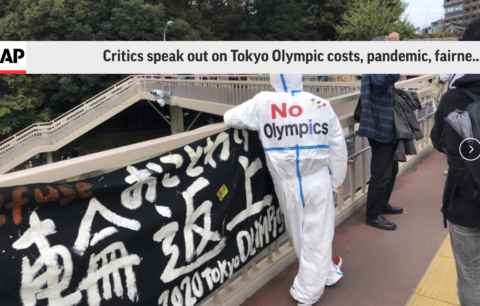
Comments by social scientist Sonja Ganseforth on recent anti-Olympic protests in Tokyo have appeared in international media. “Once the decision to hold the Olympics in Tokyo had been made, many (Japanese) also considered it anti-social or even unpatriotic to protest openly against the Games”, Sonja is quoted in the AP news article Critics speak out on Tokyo Olympic costs, pandemic, fairness published on 13 November. A version of the article also appeared in the Japan Times on 17 November. On 22 November, an interview with Sonja appeared in the German daily newspaper taz. In “Eine Absage ist möglich”, she explains the role of anti-Olympic activism in Japanese society. Sonja has been researching anti-Olympic movements in Japan as part of the DIJ special project on the Tokyo Olympics and its book publication Japan through the lens of the Tokyo Olympics. Her chapter “The difference between zero and one” is available for free download, alongside all other chapters in this open access book.
Sonja Ganseforth’s research at Coastal Transitions conference
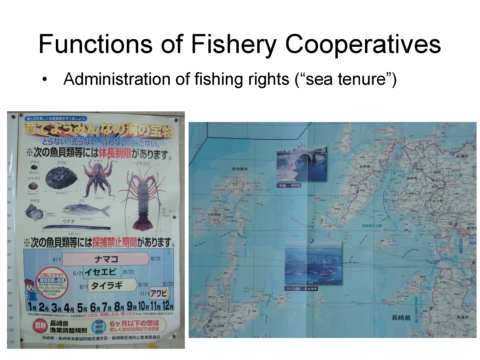 On November 6, human geographer Sonja Ganseforth presented her latest research on the implications of the Japanese Fishery Law reform for small-scale coastal fisheries at the “Coastal Transitions: Blue Economy” 2020 conference. Based on qualitative field research in rural Japan, Sonja’s paper “Blue Growth or Decline in Japanese Coastal Fisheries” analyzed how global discourses of sustainable growth and institutional reform in the Japanese fishing sector are driving the enclosure of one of the last vestiges of natural resource commons. The focus on private capital and presuppositions of economic and scientific rationality drives the commodification and enclosure of this contracting commons – a process supported by domestic political circles as well as through international agenda setting campaigns. Sonja’s presentation is part of her ongoing research project on Fishing communities between growth and demise in Japan. The online conference “Coastal Transitions: Blue Economy” was jointly organized by Liverpool John Moores University, Southern Connecticut State University and MIC University of Limerick.
On November 6, human geographer Sonja Ganseforth presented her latest research on the implications of the Japanese Fishery Law reform for small-scale coastal fisheries at the “Coastal Transitions: Blue Economy” 2020 conference. Based on qualitative field research in rural Japan, Sonja’s paper “Blue Growth or Decline in Japanese Coastal Fisheries” analyzed how global discourses of sustainable growth and institutional reform in the Japanese fishing sector are driving the enclosure of one of the last vestiges of natural resource commons. The focus on private capital and presuppositions of economic and scientific rationality drives the commodification and enclosure of this contracting commons – a process supported by domestic political circles as well as through international agenda setting campaigns. Sonja’s presentation is part of her ongoing research project on Fishing communities between growth and demise in Japan. The online conference “Coastal Transitions: Blue Economy” was jointly organized by Liverpool John Moores University, Southern Connecticut State University and MIC University of Limerick.
新駐独日本大使がDIJを訪問
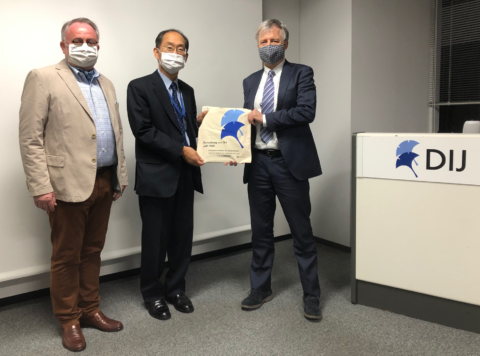
11月4日、この度在ドイツ連邦共和国全権特命大使 として赴任される柳秀直氏が当研究所を訪問されました。所長フランツ・ヴァルデンベルガーと事務局長ヨアヒム・レールは、柳大使にDIJで行われている研究とマックス・ウェーバー財団の国際的なネットワークについて説明しました。流暢なドイツ語で柳大使は、ベルリンでの2度目の赴任を、ドイツの新連邦州 への理解とつながりを深めるためにも非常に楽しみにされていることをお話し下さいました。さらに、パンデミックの影響ですべてが実現できないかもしれないとしても、来年の日独関係160周年記念行事を楽しみにしていると語られました。対談の中で柳大使は、過去30年間の日独関係の発展の中でDIJが果たしてきた重要な役割を称賛して下さいました。
柳大使は2014年から2017年までミュンヘン総領事を、その後約3年間ヨルダン大使を務められました。ベルリンに出発される数日前というお忙しい中、当研究所にお越し下さいましたことを私共は大変嬉しく光栄に思っております。
DIJ researchers in German and Japanese media
Deputy director and sociologist Barbara Holthus is quoted in the current issue of the German weekly newspaper Die Zeit (46/2020). In the article “Zurücktreten, bitte”, Barbara criticizes the restrictions imposed by the Japanese government on foreigners seeking to re-enter Japan during the Corona pandemic.
Historian Torsten Weber is quoted in the German weekly magazine Der Spiegel (45/2020). In “Globaler Kampf”, Torsten comments on nationalist elements in exhibitions promoting the Tokyo Olympics and Japan’s Olympic history. His remarks draw on research he has done for the DIJ’s special project on the Tokyo Olympics.
In the context of recent discussions about politics and academic freedom in Japan, historian of science Harald Kümmerle is quoted in a Kyodo article that was printed in several Japanese daily newspapers, including the Chūgoku Shimbun (1 November 2020). Giving the example of Albert Einstein’s expulsion from the German National Academy of Natural Sciences Leopoldina in 1933, Harald explains the treatment of Jewish scientists in Nazi Germany.
SJCC webinar on Japan’s system of corporate governance
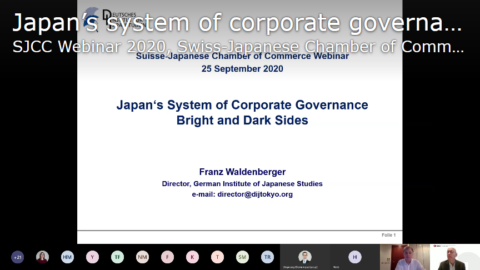
On September 25, DIJ director Franz Waldenberger was guest speaker in the SJCC webinar series, organized by the Swiss-Japanese Chamber of Commerce in cooperation with JETRO Switzerland and the Japan Club of Geneva. Even 30 years of ongoing reforms and structural changes have not improved the image of Japanese corporate governance among foreign investors. In his talk “Japan’s system of corporate governance – bright and dark sides”, Franz Waldenberger explained why Japanese boards remain to be insider controlled and what implications this has for performance. However, he also stressed the positive sides of a system where shareholders can be assured that managers are loyal to their company. A video of the webinar is available on the SJCC’s website.
Barbara Geilhorn on post-3.11 theatre in Swiss radio feature
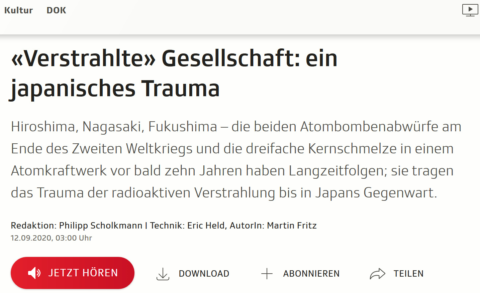
DIJ researcher Barbara Geilhorn has appeared in the SRF Swiss radio feature “Verstrahlte” Gesellschaft: ein japanisches Trauma (“Radiated” society: a Japanese trauma) by Martin Fritz. Drawing on her ongoing research project Local Issues Take Stage – Culture and Community Revitalization, Barbara provided expert commentary on how theatre in Japan has dealt with the nuclear meltdown in Fukushima in 2011. Theatre plays addressed the situation after the accident and the different reactions of people to it: either ignoring the nuclear dangers or facing them and acting accordingly. They also problematized issues of social conformity and the reluctance of Japanese people to voice criticism openly, Barbara explains. The radio programme is available as podcast on the SRF website here (in German)
DIJ research at the AAS-in-Asia 2020 conference
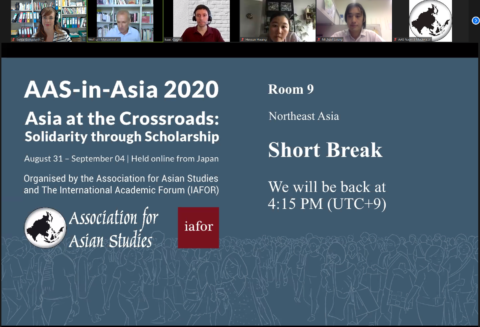 Our research fellows Isaac Gagné and Sonja Ganseforth have presented their latest research on social and economic developments in Japanese rural and fishing communities at the AAS-in-Asia 2020 conference, held online from August 31 to September 4. Isaac analyzed how residents and volunteers conceptualize and actualize local moral worlds of care through community-based services in his paper ‘Moral Worlds of Welfare: Social Isolation and Community-based Care in Aging Japan’. Sonja’s paper ‘New Marinalities of Japanese Fishing Villages’ discussed how structural change in rural Japanese fishing villages can be understood through the analysis of interconnected local, national, and global dynamics. Their panel “Rurality Check: Tracing the Nascent Global Countryside in Asia” was chaired and organized by Wolfram Manzenreiter (University of Vienna) and also had presentations by Heesun Hwang (Seoul National University) and Michael Leung (City University of Hong Kong).
Our research fellows Isaac Gagné and Sonja Ganseforth have presented their latest research on social and economic developments in Japanese rural and fishing communities at the AAS-in-Asia 2020 conference, held online from August 31 to September 4. Isaac analyzed how residents and volunteers conceptualize and actualize local moral worlds of care through community-based services in his paper ‘Moral Worlds of Welfare: Social Isolation and Community-based Care in Aging Japan’. Sonja’s paper ‘New Marinalities of Japanese Fishing Villages’ discussed how structural change in rural Japanese fishing villages can be understood through the analysis of interconnected local, national, and global dynamics. Their panel “Rurality Check: Tracing the Nascent Global Countryside in Asia” was chaired and organized by Wolfram Manzenreiter (University of Vienna) and also had presentations by Heesun Hwang (Seoul National University) and Michael Leung (City University of Hong Kong).
Barbara Holthus comments on post-Abe Japan in New York Times
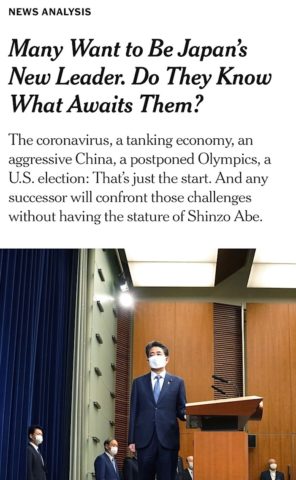 “Technology that enables more people to work from home could also help women, said Barbara G. Holthus, deputy director of the German Institute for Japanese Studies in Tokyo.” Read more of Barbara Holthus‘ comments on post-Abe Japan, teleworking, the role of women and her advice for Japan’s next prime minister in Motoko Rich’s article Many Want to Be Japan’s New Leader. Do They Know What Awaits Them? in the New York Times.
“Technology that enables more people to work from home could also help women, said Barbara G. Holthus, deputy director of the German Institute for Japanese Studies in Tokyo.” Read more of Barbara Holthus‘ comments on post-Abe Japan, teleworking, the role of women and her advice for Japan’s next prime minister in Motoko Rich’s article Many Want to Be Japan’s New Leader. Do They Know What Awaits Them? in the New York Times.

















 Open Access
Open Access
